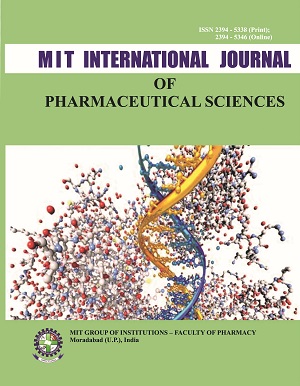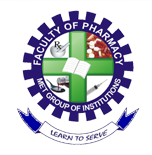
MIT INTERNATIONAL JOURNAL OF PHARMACEUTICAL SCIENCES (MITIJPS)
ISSN 2394-5338 (Print); 2394-5346 (Online)
Volume 7, Issue 2, 2022
This is open access Journal
Global Impact factor:0.565
SJIF Impact factor: 5.296
MITIJPS
Volume 6, Issue 2, 2020
Review Article
ORAL DISPERSED SYSTEMS FOR PHARMACEUTICAL PRODUCT DEVELOPMENT
Km. Shweta Mishra, Abadhesh Kumar Niranjan*
Department of pharmaceutics, Hygia Institute of Pharmaceutical Education & Research, Lucknow, 226020, Uttar Pradesh, India.
*Corresponding Author: Tel. No. : +91 8317008539, Email: niranjanpharma88@gmail.com
Abstract
Last few decades have found oral disintegrating tablets (ODTs) as one of the most fascinating dosage forms and the pharmaceutical manufacturers have showed interest in its novel development approaches. These dosage form have exhibited potential activities and most importantly are more patient compliance as compared to other dosage forms. Usually, the ODTs when administered orally, they immediately disintegrate or dissolve to release the drug within shorter period of time, even in the absence of water. The ODTs are designed and developed based on its several advantages such as easy manufacturing and administering, no or minimal adverse effects, offers immediate drug release and increases the oral bioavailability. For patients like geriatric (old age), pediatric (children’s), bedridden patients and for patients who traveling and not have access to water the oral disintegrating tablets formulated. For elderly or old age persons which have swallowing difficulty in taking tablets, capsules, suspensions and solutions like conventional oral dosage form because of hand tremors and dysphagia these oral disintegrating tablets formulations provide a product life extension opportunity. In this review we have summarized the major principle required for the development of ODTs, formulation challenges, drug candidate selection criteria, superdisintegrants used and their selection criteria. Apart from this, various conventional, patented approaches and evaluation procedures developed for ODTs that have gained significance in the international market and also various drug incorporated in ODTs have been discussed.
Keywords: Oral disintegrating tablets, Superdisintegrant, Conventional technologies, Patented, Technologies, Patient compliance
Review Article
THERAPEUTIC PROSPECTS OF GASTRORETENTIVE FLOATING DRUG DELIVERY SYSTEM: A REVIEW
Priya Sharma, Abadhesh Kumar Niranjan*
Department of Pharmaceutics, Hygia Institute of Pharmaceutical Education and Research, Lucknow, 226020, Utter Pradesh, India.
*Corresponding Author: Tel. No. : +91 8317008539, Email: niranjanpharma88@gmail.com
Abstract
The delivery of conventional drugs through oral route mostly exhibits a major limitation of poor bioavailability. Such drugs have a narrow absorption window in the gastrointestinal tract (GIT) is due to poor bioavailability. Also, some others limitations, including incomplete drug release and short residence time at the site of absorption are associated with such drugs. So, to overcome the limitations and to increase the oral absorption of these drugs, gastroretentive drug delivery systems (GRDDS) have been established. The GRDDS enables delivery of incorporated drugs in a controlled manner and also prolongs thedrug release in GIT. Apart from GRDDS, floating drug-delivery systems (FDDS) have also exhibited the competence to put up these alterations with no impacts over the drug release. This review primarily emphases on different physiological concerns associated with gastroretentive-FDDS (G-FDDS), and focuses on current scientific progresses. Also, recent literatures with distinctive focus on the mechanism of floatation and gastric retaining abilities have been explored in this review. Further, various important factors associated with FDDS, including classification, advantages, limitations and evaluations parameters has also been discussed.
Keywords: Gastrointestinal tract, Gastroretentive time, Gastroretentive drug delivery systems, Floating drug-delivery systems, Controlled, Prolonged drug release
Review Article
ANTIBACTERIAL POTENTIALS OF CLARITHROMYCIN-LOADED POLYMERIC NANOCARRIERS
Shivendra Misra, Abadhesh Kumar Niranjan*
Department of pharmaceutics, Hygia Institute of Pharmaceutical Education and Research, Lucknow , Uttar Pradesh, India.
*Corresponding Author: Tel. No. : +91 8317008539, Email: niranjanpharma88@gmail.com
Abstract
Clarithromycin (CTM) is a semisynthetic derivative of erythromycin that have been reported to exhibit potential antibiotic activities mostly against the gram-negative and gram-positive bacteria, lower/upper respiratory tract and skin infection causing pathogens. It is widely used for the prevention and management of infections due to Mycobacterium avium complexes and peptic ulcers due to Helicobacter pylori. Various marketed formulation of CTM in the form of tablets, capsules and other conventional dosage forms is available as anti-infective, however the drug itself has several limitations. These limitations include low oral bioavailability, rapid metabolism, poor targeting to infected sites and toxicity to normal cells/tissues. Also, the CTM-based therapy has been reported for several gastrointestinal adverse effects, including diarrhea, stomach upset, gastric distress, atypical taste and others. Thus, to overcome these issue, various novel strategies including nanotechnology or nanocarrier-based approaches have showed significant effects and have been immensely considered worldwide. In recent years, the various nanocarriers or nanocarrier-based delivery systems, particularly the polymeric nanocarrier have played significant role in effective drug targeting. Thus, in this review, the various polymeric nanocarrier-based delivery systems of CTM that effective reduced the dosing frequency, improved the patient compliance and potentially enhanced the therapeutic efficiency of CTM has been summarized.
Keywords: Clarithromycin, Nanocarriers, Antibacterial preparations, Polymeric formulations
Review Article
NUTRACEUTICALS AND ITS HEALTH BENEFITS: A REVIEW
Bhavana, Deepti Chaudhary*, Faiz Waris
Moradabad of Educational Trust Group of Institutions Faculty of pharmacy, Moradabad, Uttar Pradesh-244001, India.
*Corresponding Author: Tel. No. : +91 9870756270, Email: deepti9493@gmail.com
Abstract
Nutraceuticals are the food supplements which are used by humans to provide some basic nutrients to prevent them from chronic diseases and improve the quality of life by fulfilling basic needs of body. These products are generally consumed without prescription and supervision. In recent years, people interest in nutraceuticals are increasing day by day because of their nutrition and pharmaceutical activity. They are the best alternative for modern medicines. Global nutraceutical market is growing very vastly due to their high demands in public. Nutraceuticals can be obtained from various sources like plants, animals, microbes and even they can be modified by using biotechnology. Nutraceuticals can be used in preventing chronic diseases like, cancer, diabetes, inflammation and they are even playing role as immunity enhancer and antioxidants in the corona virus disease or COVID-19.
Keywords: Nutraceuticals, Health, Food, Chronic diseases, Nutrition
Review Article
ROLE OF NATUROPATHY & YOGA IN PROPHYLAXIS DURING COVID-19
Shivani Agarwal*a, Kartikay Prakashb, Manjari Mittala
aMoradabad Educational Trust Group of Institutions Faculty of Pharmacy, Moradabad, Uttar Pradesh, India.
bRadha Govind Institute of Pharmacy, Chandausi, Moradabad, Uttar Pradesh, India.
*Corresponding Author: Tel. No. : +91 9456689876, E-mail: shivaniagarwalmbd2013@gmail.com
Abstract
Whole planet is now suffering from a respiratory illness or disease entitled as CORONAVIRUS DISEASE. This disease is caused by a very highly infectious virus known as SARS-CoV-2 or COVID-19 virus. Coronavirus disease is a highly contagious disease. WHO declared this disease as a Pandemic and till date, COVID-19 was spread in more than 215 countries and territories. Naturopathy is a traditional system of medicine and used since ancient time. Naturopathy can be considered as the system of lifestyle medicine. This review covers how Yoga and Naturopathy plays a important role in prophylaxis during COVID-19 as well as some measures and methods for preventive care, immune enhancement and symptom management.
Keywords: Naturopathy, Yoga, Prophylaxis, COVID-19, India
Review Article
A NOVEL CRISPER/CAS9-13 BASED DIAGNOSTIC TOOL FOR COVID-19: A REVIEW
Amit Kumar Dubeya,b*, Raj Kishor Pandeya,c
aDepartment of Biotechnology, National Institute of Pharmaceutical Education and Research (NIPER), Hajipur 844102, Bihar, India.
bDivision of Biochemistry, Rajendra Memorial Research Institute of Medical Sciences, Patna, 800007, India.
cMoradabad Educational Trust Group of Institute of Institutions Faculty of Pharmacy, Moradabad 244002, Uttar Pradesh, India.
*Corresponding Author: Tel. No. : +91 9631024356, Email: dubey.vedant@gmail.com
Abstract
COVID-19 is a viral disease caused by the SARS-CoV-2 virus and now it becomes a severe global pandemic. Its atrocity can be imagining by its world-wide lockdown and WHO monitoring at the special focus. This mutant corona 2019 viral strain is emerging as a disaster on earth in the last 20 years. Diagnosis is the first step in the detection of any diseases either native or pandemic level before the treatment through medication or vaccination. Early and fast diagnosis is the primary step for rapid spreading pandemic contagion infections. In this review, we have discussed recently developed CRISPR–Cas-based diagnosis detection tool from the respiratory swab RNA extracts for SARS-CoV-2. It is a rapid, specific and sensitive technique using nowadays due to its robustness than pervasively PCR, ELISA based diagnosis methods.
Keywords: COVID-19, SARS-CoV-2, PCR, ELISA
Short Communication
ARTIFICIAL INTELLIGENCE: A PROMISING TOOL FOR TRANSFORMING THE HEALTHCARE SYSTEM
Tarani Prakash Shrivastavaa,b, Maneesh Sonia*, Jai Prakasha
aNational Coordination Centre-Pharmacovigilance Programme of India, Indian Pharmacopoeia Commission, Ghaziabad-201002, India
bDelhi Pharmaceutical Sciences and Research University, Puspvihar Sector 3 New Delhi 110017, India.
*Corresponding Author: Tel. No. : +91 9977484175, Email: manishsoni.pharmacist@gmail.com
Short Communication
A BRIEF STUDY OF THE ACUTE RESPIRATORY SYNDROME CORONAVIRUS 2 (SARS-COV-2) PANDEMIC IN 2019
Pankaj Singh Patel*, Shivam Kumar Gupta, Prasanta Kumar Mohapatra, Harish Chandra Verma, Mandeep Kumar Gupta
Moradabad Educational Trust, Group of Institutions, Faculty of Pharmacy, Moradabad.
*Corresponding Author: Tel. No. : +91 8630152629, E-mail: pankajsinghpatel@gmail.com
